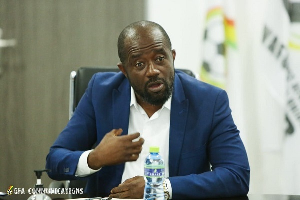The Trade Union Congress (TUC) of Ghana, once a formidable force in the nation's
socio-political landscape has experienced a period of dormancy that has allowed
successive governments to sideline their influence. However, a recent event has
pointed to a possible reawakening of this sleeping giant, suggesting a renewed
determination to advocate for workers' rights and influence national policy.
A Legacy of Activism and Influence:
In the early years of Ghana's republic, the TUC was a powerful advocate for workers' rights and social justice. The union played a crucial role in the independence movement and the subsequent development of the nation. Their influence was felt across various sectors, and their ability to mobilize workers made them a significant political force.
However, as Ghana transitioned into the Fourth Republic, the TUC's influence
waned. Internal divisions, leadership struggles, and external pressures led to a
period of inactivity and inefficacy. Governments, recognizing this weakened state, often disregarded the union's input on critical issues, leading to policies that sometimes undermined workers' interests.
The Slumber of the Fourth Republic:
Throughout much of the Fourth Republic, the TUC appeared to be a shadow of its
former self. Several pivotal issues arose in Ghana, such as economic reforms, labor rights disputes, and social justice movements, but the TUC's voice was
conspicuously muted. Divided ranks and inconsistent leadership contributed to this silence, allowing governments to pass legislation and implement policies with little resistance from what was once a powerful labor union.
Some notable examples of the TUC's dormancy were during the privatization of key
national assets, the current blatant and obvious corrupt practices across the
political sphere, and the removal of performing anti-graft officers, among others. The union's inability to present a united front or effectively challenge government decisions led to a sense of disillusionment among numerous workers and the public alike.
The Turning Point: SSNIT Hotels Privatization:
A significant turning point in the TUC's most recent history was the government's attempt to privatize 60% of some SSNIT hotels. This move, perceived by many as detrimental to national interests and workers' welfare, sparked a resurgence of activism within the TUC. The union's leadership action, ignited by Hon. Samuel Okudzeto Abakawa's exposé and subsequent recognition of the critical nature of the issue, mobilized their members and other stakeholders to oppose the privatization plan.
The apolitical demonstration and threat of a nationwide strike that preceded this government backing down and the spontaneous anger by people from all nooks and crannies show how the masses are waiting and calling for the leadership of the TUC and their allies to work. Another sleeping giant, THE GHANA BAR association, should take a clue and live up to its billing. Remember, you should not just be known as our learned and erudite fraternity; you must be seen and act accordingly.
This renewed vigor and unity among the TUC ranks led to a successful pushback
against the government's plans. The victory was symbolic, representing not just the protection of national assets but also the reawakening of the TUC's potential to influence national policy and protect workers' rights. REMEMBER, OTHER STATE ASSETS ARE CURRENTLY UNDER SIEGE!
The Path Forward: A Call to Action:
The successful resistance to the SSNIT Hotel privatization has breathed new life into the TUC, demonstrating their potential to effect change when united and determined. However, this resurgence must be sustained if the TUC is to reclaim its place as a key player in Ghana's democracy.
The current and future leadership of the TUC must take heed of this moment. They
have the opportunity to rebuild the union's influence, champion workers' rights,
and hold the government accountable. By addressing internal divisions,
strengthening their organizational structure, consistently advocating for the interests of their members, and avoiding political infiltration into their ranks, the TUC can transform Ghana from its current state into an admirable democracy respected across Africa and the world.
Conclusion: The Sleeping Giant Awakens:
The TUC of Ghana stands at a crossroads. The recent events around the SSNIT
Hotel privatization has shown that the union still possesses the power to shape national policy and protect workers and people's rights. The challenge now is to maintain this momentum, unite their ranks, and consistently advocate for the betterment of Ghanaian society.
As Ghana continues to navigate its socio-economic challenges, a strong and active TUC is essential. The union's leaders must rise to their responsibilities, ensuring that they remain a formidable force for positive change. Posterity will judge their actions, and the TUC's legacy will depend on their ability to awaken from their slumber and lead with conviction and purpose.
SLEEPING GIANTS ARISE NOW AND FOREVER!
Opinions of Wednesday, 17 July 2024
Columnist: Dr. Yao Eli Sebastian Nafrah



















